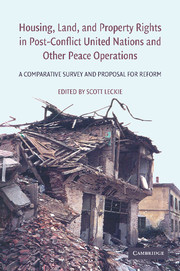 Housing, Land, and Property Rights in Post-Conflict United Nations and Other Peace Operations
Housing, Land, and Property Rights in Post-Conflict United Nations and Other Peace Operations Book contents
- Frontmatter
- Contents
- Contributors
- Acknowledgments
- Foreword by Dan Lewis
- I INTRODUCTION
- II CASE STUDIES
- 2 Stability, Justice, and Rights in the Wake of the Cold War: The Housing, Land, and Property Rights Legacy of the UN Transitional Authority in Cambodia
- 3 The Response of the United Nations Interim Administration Mission in Kosovo to Address Property Rights Challenges
- 4 Balancing Rights and Norms: Property Programming in East Timor, the Solomon Islands, and Bougainville
- 5 Housing, Land, and Property Restitution Rights in Afghanistan
- 6 Peacekeeping and HLP Rights in the Great Lakes Region of Africa: Burundi, Rwanda, and DR Congo
- 7 The Trouble with Iraq: Lessons from the Field on the Development of a Property Restitution System in “Post”-Conflict Circumstances
- 8 Sudan's Comprehensive Peace Agreement: An Opportunity for Coherently Addressing Housing, Land, and Property Issues?
- 9 The Impacts of UN Peace Operations on Local Housing Markets
- III CONCLUSIONS
- Index
4 - Balancing Rights and Norms: Property Programming in East Timor, the Solomon Islands, and Bougainville
Published online by Cambridge University Press: 15 July 2009
- Frontmatter
- Contents
- Contributors
- Acknowledgments
- Foreword by Dan Lewis
- I INTRODUCTION
- II CASE STUDIES
- 2 Stability, Justice, and Rights in the Wake of the Cold War: The Housing, Land, and Property Rights Legacy of the UN Transitional Authority in Cambodia
- 3 The Response of the United Nations Interim Administration Mission in Kosovo to Address Property Rights Challenges
- 4 Balancing Rights and Norms: Property Programming in East Timor, the Solomon Islands, and Bougainville
- 5 Housing, Land, and Property Restitution Rights in Afghanistan
- 6 Peacekeeping and HLP Rights in the Great Lakes Region of Africa: Burundi, Rwanda, and DR Congo
- 7 The Trouble with Iraq: Lessons from the Field on the Development of a Property Restitution System in “Post”-Conflict Circumstances
- 8 Sudan's Comprehensive Peace Agreement: An Opportunity for Coherently Addressing Housing, Land, and Property Issues?
- 9 The Impacts of UN Peace Operations on Local Housing Markets
- III CONCLUSIONS
- Index
Summary
Appropriate policies for housing, land, and property (HLP) are important elements of a successful peace operation. This chapter considers property-related policies in East Timor, the Solomon Islands, and Bougainville. These cases fall in the region to the northeast of Australia that has become known as an “arc of instability.” While each case involved very different forms of peace operations – from the UN transitional administration in East Timor to Australian-led peacekeeping in the Solomon Islands and Bougainville – all had very similar HLP problems. These included a range of post-conflict phenomena: mass population displacement, widespread damage to housing and land administration, and systematic failure in the institutions of government. They also involved a land issue common to many postcolonial conflicts, namely, the status and recognition of customary land tenure.
We base our analysis of each case around the application (or nonapplication) of international standards. The relevant international standards relating to property may be summarized as follows:
Housing: There is a basic right to adequate housing. There are also more specific rights to equality and nondiscrimination in the provision of housing.
Restitution: All displaced persons have a basic right of return. This right may now include a right of return to one's home, or compensation in lieu of such return.
Tenure Security: Landholders have a right to secure forms of land tenure. This right may be found in guarantees of private property, or in support for common property systems. It encompasses protection against forced evictions.
Access: Indigenous groups have a right to access and manage resources in their traditional territory.
[…]
- Type
- Chapter
- Information
- Housing, Land, and Property Rights in Post-Conflict United Nations and Other Peace OperationsA Comparative Survey and Proposal for Reform, pp. 103 - 135Publisher: Cambridge University PressPrint publication year: 2008


